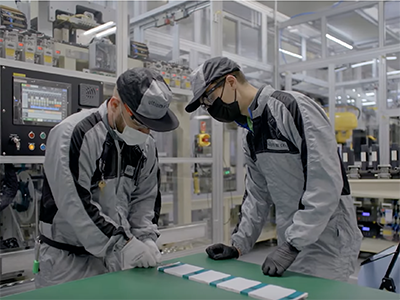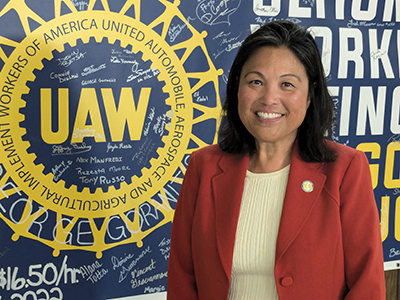LORDSTOWN, Ohio – There was an overwhelming feeling on March 6, 2019, that the United Auto Workers union was all but finished in the Mahoning Valley.
That day, the final Chevrolet Cruze rolled out of the General Motors Lordstown assembly plant – the last vehicle manufactured at the factory under the GM nameplate after more than a half century of automobile production. Closure of the plant meant the end of 1,600 good-paying UAW jobs. The union hall of Local 1112 gradually grew silent, the lights kept on with minimal staff to address retirees’ issues and concerns.
George Goranitis, then an assembly line worker, was concerned about his future. “We lost our jobs in 2019. So a lot of us had to transfer,” he says. Goranitis relocated to GM’s operations in Spring Hill, Tenn., only to return to the area after a year-and-a-half on the job. “I decided to cut ties with GM and move back home.”
He worked several jobs before he decided to apply at Ultium Cells LLC, the joint venture between GM and South Korea-based LG Energy Solution located near the automaker’s former assembly plant in Lordstown. Construction on Ultium’s $2.3 billion electric-vehicle battery cell plant was winding down and Goranitis saw it an opportunity to get in on the future. He was hired March 7, 2022.
Almost immediately, Goranitis recognized the need for organizing the workers there. As a joint venture startup, Ultium employees were not covered under GM’s labor agreement.
“We just knew – because of Lordstown’s history – that we had to organize and get these jobs back here,” he said. “We were known in the Mahoning Valley for having great-paying union jobs. Over the years, they shut down and the only thing left was Lordstown.” At one point during the late 1960s, GM employed some 14,000 workers.
Today, UAW Local 1112 is reinvigorated with Goranitis as its recently elected president, representing just under 2,000 workers in the Ultium plant under new landmark local and national collective bargaining agreements. “It’s been a crazy journey and we’ve had our ups and downs,” he says.
Organizing the Plant
When he started, Goranitis recalls, materials drivers earned $15 per hour and production workers $16.50, far lower than the $32 an hour wage once paid to Lordstown assembly workers. Some employees, he adds, worked second or third jobs just to make ends meet. “We had single mothers on government assistance,” he says. “It was a tough time.”
Others couldn’t hold out long enough for contract negotiations to bear fruit. “A lot of members could not wait for us to negotiate a better contract,” he says. “They had to go out and find a better-paying job. And they were great workers.”
Those who remained are glad they did. “There are times I wanted to give up,” says Lindell Brown, who started at the plant 2 1/2 years ago. “We’ve been blessed and I’m glad I stuck in.”
In June 2022, a UAW “card-check” proposal – a process where organizers could place union recognition on the fast-track by entering the plant and asking employees to sign cards either in support of or against union representation – was rejected by Ultium. That led to an election administered by the National Labor Relations Board in December, when workers overwhelmingly voted to join the UAW.
Goranitis was elected to the local bargaining committee, aware that such an agreement would be the first of its kind. “We didn’t know how it would go because this was the first EV facility in the U.S.,” Goranitis says. “There were a lot of things to figure out because it’s all new.”
What followed was 16 months of negotiations marked by several breakthroughs.

In late August 2023, Ultium agreed to an interim wage hike. Simultaneously, UAW International President Shawn Fain instigated coordinated strikes against select GM, Stellantis, and Ford Motor Co. plants as it pursued a new national agreement with GM, Ford and Stellantis.
In October of that year, the UAW announced that GM would include Ultium workers in a new national contract.
This June. UAW members at Ultium ratified the first local collective bargaining agreement with an EV battery cell manufacturer.
Under the new agreement, UAW workers are now considered GM employees, says John Johnson, Local 1112 financial secretary and a member of the bargaining unit. “When we got into the national agreement, we knew we were OK,” he says. “But we needed a local contract.”
Johnson says many didn’t realize as negotiations continued how much was at stake. “When we were doing the local contract, they [UAW] kept telling us that we were setting the standard. It didn’t sink in until the local contract was done,” he says. “We were the first ones. So there was a lot of pressure.”
A Pioneering Agreement
Among the hallmarks of the new contract are wage increases plus health and safety language that gives Local 1112 a bigger voice at the table related to these issues, Johnson says. The base wage, for example, begins at $26.91 an hour – $30.50 an hour if the employee has worked a year. Other benefits include GM contributing an amount based on 10% of a worker’s wage into a 401(k) plan regardless of any employee contribution. There are also cost-of-living adjustments in the new national contract, a measure that many thought was impossible to negotiate, Johnson says. The agreement is in force until April 2028.
While the wage increases are critical, Goranitis says, new health and safety language adopted in the local contract serves to set the course for agreements at other EV plants. “With this being new in the U.S., there are a lot of different health and safety issues compared to other General Motors plants,” he says. “We’re dealing with different chemicals and materials to make the battery cells.”
The union president says Local 1112 worked with Ultium to make great improvements to plant safety. In October 2023, the U.S. Department of Labor proposed more than $270,000 in penalties for health and safety violations following an explosion and fire at the plant in March of that year.
“We’ve come a long way working with the company. We have more work to do. But we’ve set standards going forward,” Goranitis says, noting that language forged in the local agreement was eventually inserted into the national contract.
Johnson says EV battery plants seeking to organize have a strong foundation to build upon because of Local 1112’s efforts: “Now, others are following our pattern. It was crucial.”
The agreement also makes it possible for Lordstown assembly employees who relocated after the plant closed to return to the community as GM employees with Ultium. About 170 have since returned to the Mahoning Valley to work at the plant.
“There’s still some people on a waiting list to get back,” says Dave Green, director of UAW District 2B and the former president of locals 1112 and 1714, which represented workers at GM’s assembly and metals stamping plant in Lordstown.
Green says the UAW’s achievements this year have placed it at the forefront of the national labor movement and the union has endorsed Vice President Kamala Harris, the Democratic Party’s nominee, for president. “I got to talk to her last week,” he says, “and we’re excited about her campaign.”
In a video released last month, the UAW cast the Lordstown plant closure in 2019 as a central theme as to why it supports Harris and not the Republican Party’s nominee for president, Donald J. Trump.
“He said all those jobs would be coming back,” the UAW’s Fain says in the video. “Then he did nothing.” Today, Fain says, “tens of thousands of auto jobs are returning to the United States, thanks to the policies of the Biden-Harris administration.”

The agreement between Ultium and the UAW grabbed the attention of Acting U.S. Secretary of Labor Julie Su, who addressed Local 1112 members at the union hall in Jackson Township on Aug. 15.
“You are setting a course for your community, for this state, for this industry, and for this country that is going to be revolutionary,” she said.
Su stopped at the union hall as part of the U.S. Department of Labor’s Good Jobs Summer Tour, promoting how the policies of the Biden administration has helped to encourage job growth and better wages for workers.
Su emphasized that the UAW is paving the way to reinvigorate union activity throughout the country. “This is a moment in new worker power, in new union power,” she said. “The UAW is really leading the way and showing what that worker power looks like – how good that is for working people, how good that is for communities.”
Green says Local 1112’s ratification of its agreement with Ultium was a pivotal moment, especially as he witnessed firsthand the disintegration of the local.
“Five years ago, we were in a very different place here in Lordstown,” he said. “The community was decimated. The workforce was obliterated. People lost houses, filed bankruptcy.” Green himself relocated to work at a GM plant in Bedford, Ind., before being elected to the District 2B position.
Green, who returned to the union hall on Aug. 15, says he’s thrilled to see the building again teeming with activity.
“I thought we would never be back here,” he says. “Without the retirees carrying the torch for this local union, it might not be here today.”
Still, Green is adamant about not dwelling on the past. “We’re not looking back,” he says. “We’re going to continue to move forward.”
Pictured at top: John Johnson and George Goranitis are on the bargaining team that secured a contract with Ultium Cells.
